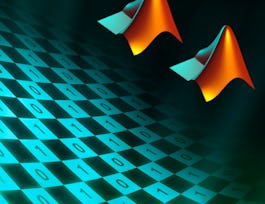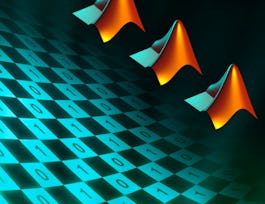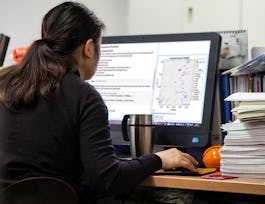This course teaches computer programming to those with little to no previous experience. It uses the programming system and language called MATLAB to do so because it is easy to learn, versatile and very useful for engineers and other professionals. MATLAB is a special-purpose language that is an excellent choice for writing moderate-size programs that solve problems involving the manipulation of numbers. The design of the language makes it possible to write a powerful program in a few lines. The problems may be relatively complex, while the MATLAB programs that solve them are relatively simple: relative, that is, to the equivalent program written in a general-purpose language, such as C++ or Java. As a result, MATLAB is being used in a wide variety of domains from the natural sciences, through all disciplines of engineering, to finance, and beyond, and it is heavily used in industry. Hence, a solid background in MATLAB is an indispensable skill in today’s job market.


Introduction to Programming with MATLAB
This course is part of MATLAB Programming for Engineers and Scientists Specialization
Taught in English
Some content may not be translated


Instructors: Akos Ledeczi
485,006 already enrolled
Included with 
Course
(17,384 reviews)
98%
What you'll learn
You will learn fundamental computer programming concepts such as variables, control structures, functions and many others.
You will learn about various data types and how to handle them in MATLAB.
You will learn the powerful support MATLAb provides for working with matrices.
You will learn about file input/output.
Skills you'll gain
Details to know

Add to your LinkedIn profile
1 quiz
Course
(17,384 reviews)
98%
See how employees at top companies are mastering in-demand skills

Build your subject-matter expertise
- Learn new concepts from industry experts
- Gain a foundational understanding of a subject or tool
- Develop job-relevant skills with hands-on projects
- Earn a shareable career certificate


Earn a career certificate
Add this credential to your LinkedIn profile, resume, or CV
Share it on social media and in your performance review

There are 9 modules in this course
What's included
1 video3 readings
We will learn how to start MATLAB and will familiarize ourselves with its user interface. We will learn how to use MATLAB as a sophisticated calculator. We will learn about syntax and semantics. We will see ways in which MATLAB provides help. Finally, we will learn how to create plots in MATLAB.
What's included
7 videos1 reading2 app items1 plugin
The basic unit with which we work in MATLAB is the matrix. We solve problems by manipulating matrices, and operators are the primary means by which we manipulate them. We will learn how to define matrices, extract parts of them and combine them to form new matrices. We will learn how to use operators to add, subtract, multiply, and divide matrices, and we will learn that there are several different types of multiplication and division. Finally, we will learn MATLAB’s rules for determining the order in which operators are carried out when more than one of them appear in the same expression.
What's included
6 videos1 reading1 quiz3 app items
Functions let us break up complex problems into smaller, more manageable parts. We will learn how functions let us create reusable software components that can be applied in many different programs. We will learn how the environment inside a function is separated from the outside via a well defined interface through which it communicates with that outside world. We will learn how to define a function to allow input to it when it initiates its execution and output from it when it is done.
What's included
7 videos1 reading3 app items
MATLAB has useful built-in functions and we will explore many of them in this section. We will learn about polymorphism and how MATLAB exploits it to change a function's behavior on the basis of the number and type of its inputs. Because random numbers play an important role in computer programming, we will learn how to use the MATLAB random number generator. We will learn how to get input from the keyboard, how to print to the Command Window, and how to plot graphs in a Figure window. Finally, we will learn how to find programming errors with the help of the debugger.
What's included
5 videos1 reading2 app items
Selection is the means by which MATLAB makes decisions about the order in which it executes its statements. We will learn how to use the if-statement, which is the most important method of selection. We will learn how to use relational operators and logical operators. We will learn how to write polymorphic functions and how to make functions resistant to error.
What's included
7 videos2 readings4 app items
Loops give computers their power. We will learn how to use both of MATLAB's loop constructs: the for-loop and the while-loop. We will learn how the break-statement works, and we will use nested loops. We will learn how to make loops more efficient. We will learn about logical indexing and will see how to use it to produce implicit loops that are efficient and easy for a user to understand.
What's included
5 videos2 readings4 app items
Computers operate on bits, but humans think in terms of numbers, words, and other types of data. Like any good language, MATLAB organizes bits into convenient data types. We will study those types in this section. We will learn that there are ten types of numbers and that there are conversion functions to change one type into another. We will learn much more about strings and how the characters in them are encoded as numbers. We will learn how to produce heterogeneous collections of data via structs and cells, and we will learn how to store points in time and time durations.
What's included
6 videos3 readings2 app items
Files are named areas in permanent memory for storing data that can be used as input or output to MATLAB and to other programs. We will be introduced to MATLAB’s most important methods for reading and writing files. We will learn how to create, read from, and write into MAT-files, Excel files, text files, and binary files. We will learn how to navigate among folders with MATLAB commands.
What's included
4 videos5 readings5 app items
Instructors


Offered by
Recommended if you're interested in Software Development

Vanderbilt University

Vanderbilt University

Vanderbilt University
Why people choose Coursera for their career




Learner reviews
Showing 3 of 17384
17,384 reviews
- 5 stars
82.96%
- 4 stars
14.65%
- 3 stars
1.69%
- 2 stars
0.26%
- 1 star
0.43%
New to Software Development? Start here.

Open new doors with Coursera Plus
Unlimited access to 7,000+ world-class courses, hands-on projects, and job-ready certificate programs - all included in your subscription
Advance your career with an online degree
Earn a degree from world-class universities - 100% online
Join over 3,400 global companies that choose Coursera for Business
Upskill your employees to excel in the digital economy
Frequently asked questions
Access to lectures and assignments depends on your type of enrollment. If you take a course in audit mode, you will be able to see most course materials for free. To access graded assignments and to earn a Certificate, you will need to purchase the Certificate experience, during or after your audit. If you don't see the audit option:
The course may not offer an audit option. You can try a Free Trial instead, or apply for Financial Aid.
The course may offer 'Full Course, No Certificate' instead. This option lets you see all course materials, submit required assessments, and get a final grade. This also means that you will not be able to purchase a Certificate experience.
When you enroll in the course, you get access to all of the courses in the Specialization, and you earn a certificate when you complete the work. Your electronic Certificate will be added to your Accomplishments page - from there, you can print your Certificate or add it to your LinkedIn profile. If you only want to read and view the course content, you can audit the course for free.
If you subscribed, you get a 7-day free trial during which you can cancel at no penalty. After that, we don’t give refunds, but you can cancel your subscription at any time. See our full refund policy.


